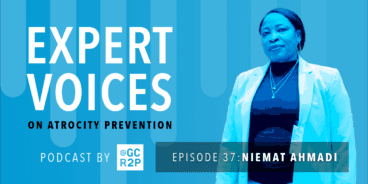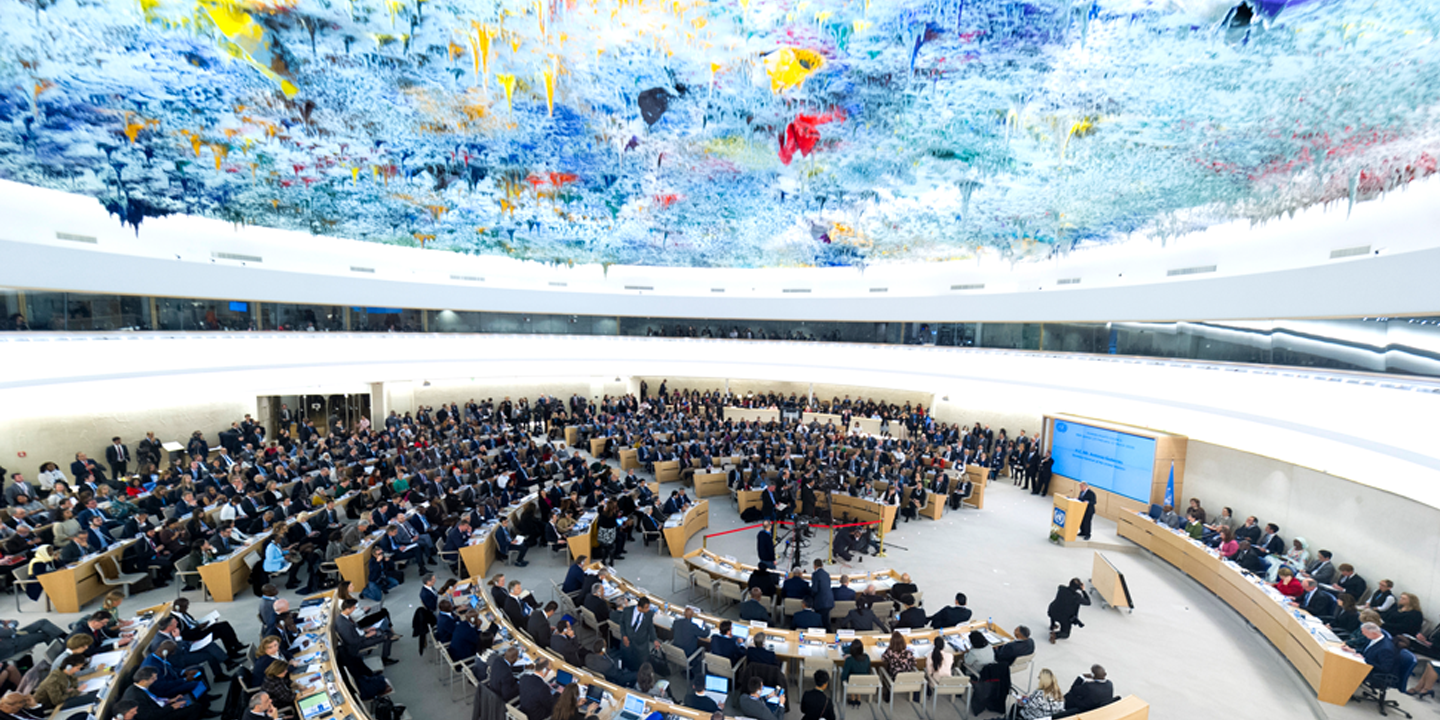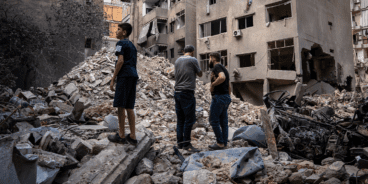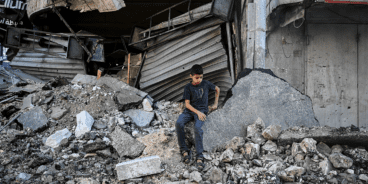

Written Submission to the UN Human Rights Council Intersessional Meeting on the Prevention of Genocide
This submission was prepared by the Global Centre for the Responsibility to Protect – an independent organization that focuses on conducting research, analysis and advocacy in relation to mass atrocity crimes. The Global Centre is the leading international authority on the Responsibility to Protect (R2P) and since its inception in 2008 it has expanded and deepened global support for the norm. The Global Centre plays a unique role at the United Nations (UN) as the only organization carrying out monitoring, research and advocacy on all current and potential mass atrocity situations around the globe, as well as working with governments, the UN Human Rights Council and Security Council to translate this research into actionable policy responses.
STRENGTHENING NATIONAL CAPACITIES FOR THE PREVENTION OF GENOCIDE
Modern history demonstrates that genocide, ethnic cleansing, war crimes and/or crimes against humanity can occur almost everywhere. Genocide and other mass atrocity crimes are often the result of long-standing discriminatory practices, the targeting of vulnerable groups, patterns of violations and abuses of human rights and a lack of strong domestic institutions.
Genocide as a crime is distinct from the commission of other atrocity crimes as it includes the intent to destroy, in part or whole, an entire group. As history has taught us, genocide does not happen overnight, but requires planning and organization on the part of the perpetrator. As such, genocide is preventable if warning signs are taken seriously and followed by early action.
On a national level, risk factors for genocide and other mass atrocity crimes must be addressed through holistic policies and processes aimed at countering discrimination and marginalization. This includes strengthening legislative and institutional frameworks to guarantee principles of non-discrimination, ensuring the presence of various communities in political and public offices, and investigating all cases of discriminatory behavior or dangerous public discourse, even when practiced by popular politicians and leaders.
Governments should undertake the following measures to strengthen national capacities for the prevention of genocide and other atrocity crimes:
1. Create a national strategy or plan for genocide and atrocity prevention
Genocide and atrocity prevention are domestic policy imperatives. It is a cross-cutting issue that is relevant to the work of various departments and ministries, including national security, justice, human rights, minority affairs, women and child welfare, education, culture, health and beyond. A holistic, government-wide atrocity prevention strategy can aid in assessing national vulnerabilities to atrocities, strengthening societal resilience and building structural mechanisms to prevent or respond to atrocity risks. A national strategy on atrocity prevention can also equip political actors with the necessary contextual knowledge on risks factors for genocide and other atrocity crimes to comprehensively assess policy options and timely and consistent responses aimed at protecting populations and holding perpetrators accountable. Such a strategy should be rooted in the principle of R2P.
2. Enact legislation that facilitates structural atrocity prevention
The Convention on the Prevention and Punishment of the Crime of Genocide (Genocide Convention) obliges states to take measures to prevent and punish the crime of genocide. Governments should expeditiously sign and ratify the Genocide Convention and enact domestic legislation criminalizing genocide in accordance with the Convention. States should also adopt domestic legal protection for vulnerable groups and communities to help strengthen their capacity to prevent or halt genocide and other atrocities. National legal frameworks should include the protection of minority rights and legislation against hate speech and incitement.
-Minority rights protection. Minority groups are often the most marginalized and vulnerable groups within society and are most likely to be exposed to structural discrimination, racism and exclusion from participation in economic, political and social life. In addition to adopting domestic legislation that aims to protect minority rights, states should ratify international treaties that protect and enhance human rights to prevent discrimination, exclusion and hostility against members of minority groups.
-Legislation against hate speech and incitement. One of the most important early warning signs of genocide is the proliferation of hate speech and incitement. Hate speech is rhetoric that marginalizes and targets people on the basis of their religion, ethnicity, gender, sexual orientation or race. In other words, it is language that demonizes people not for anything that they have done, but for who they are. Such dangerous speech erodes social cohesion and lays the foundation for violence against vulnerable groups. Discriminatory public discourse against communities based on their identity normalizes violence against individuals or groups who are perceived as “threats,” which may incite its audience to engage in greater violence and acts of genocide. Governments should enact domestic legislation aimed at preventing hate speech and incitement, while guaranteeing the right to freedom of speech. Furthermore, states should utilize the recommendations outlined in the UN Plan of Action and Strategy on Hate Speech to identify gaps and challenges on a national level.
3. Appoint an R2P Focal Point
Governments can strengthen capacities for genocide and atrocity prevention by appointing a senior-level government official responsible for the promotion of mass atrocity prevention at national and international level. Currently, 61 countries from all regions of the world – as well as the European Union (EU) and the Organization of American States (OAS) – have an R2P Focal Point and are part of the Global Network of R2P Focal Points, which meets annually to exchange best practices and strategies for strengthening atrocity prevention, including on a national level. Members of the Global Network include states that have never experienced mass atrocities domestically as well as states with populations currently experiencing, or at imminent risk of, mass atrocity crimes. The placement of an R2P Focal Point within a particular ministry or office is decided by each individual government, taking into account its structure and priorities, including whether the R2P Focal Point’s responsibilities are focused on national or international atrocity prevention. More information can be found here.
4. Systematically engage with civil society organizations
Although the prevention of genocide and other atrocity crimes is the primary responsibility of the state, civil society organizations can be instrumental in identifying early warning indicators of genocide, providing recommendations for necessary action at a national and local level, and alerting the international community if governments are unable or unwilling to act. Therefore, governments should regularly call on the expertise of civil society, including through regular consultations with national and local human rights defenders and NGOs. Through the Universal Periodic Review (UPR) process, governments should consult national civil society to identify existing risk factors for mass atrocity crimes and ensure that recommendations towards addressing risk factors are implemented across the domestic system.
5. Strengthen atrocity prevention with education
Educating government officials and the wider population is a crucial tool for domestic atrocity prevention. Organizing trainings for public servants and politicians on R2P and mass atrocity prevention raises awareness within institutions and improves their ability to analyze potential risk factors for atrocities, develop comprehensive policies, and identify and strengthen existing local resources to address risk factors. To build resilient societies, states must develop curricula that promote diversity and inclusion, foster social solidarity, prevent prejudice and acknowledge past atrocities. Governments can also strengthen genocide and atrocity prevention by translating the UN Framework of Analysis for Atrocity Crimes into local languages and organize public events to promote it domestically.
PROMOTING PARTICIPATION IN REGIONAL INITIATIVES FOR GENOCIDE AND ATROCITY PREVENTION
Regional organizations play a unique role in preventing and responding to genocide and other mass atrocities, as well as in taking effective collective action to protect civilians. These organizations are often best placed to guide multilateral action on situations emerging in their region. Such organizations may have a better understanding of political dynamics and are composed of neighboring states who may be disproportionately affected in the aftermath of atrocities.
6. Regional organizations should appoint an R2P Focal Point to work collaboratively on atrocity prevention with their member states
The appointment of R2P Focal Points by the EU and OAS were significant achievements that may enable more efficient and collaborative work on atrocity prevention among states in these regions. By appointing a senior diplomat as an R2P Focal Point, regional organizations can further strengthen multilateral action on emerging atrocity situations through its mechanisms and procedures. A regional R2P Focal Point can be crucial to enabling the integration of genocide and mass atrocity prevention within different sectors of the organization, helping to facilitate information sharing and creating linkages between different member states to regularly exchange on best practices and lessons learned. States that have appointed an R2P Focal Point should be encouraged to apply collective pressure on relevant regional bodies to encourage the appointment of a regional R2P Focal Point. Such an appointment would signal that the regional organizations can and will play a key role in responding to emerging crises by systematically applying an atrocity prevention lens to their mandate.
7. Utilize regional mechanisms to share best practices and develop preventive tools
While genocide and atrocity prevention, or a direct reference to R2P, may not be in the founding documents of all regional organizations, many of them operate within the spirit of mass atrocity prevention. For example, institutional mechanisms for providing technical assistance to member states and various regional field operations support the implementation of Pillar II of R2P. Collaboration among member states should be strengthened to regularly share best practices and develop relevant preventive tools. Preventing genocide and other mass atrocities by upholding R2P may also aid in defending the organization’s interests in ensuring the stability and security of the region. One example is the EU’s “Integrated Approach” to conflicts and crises, which ensures that all EU foreign policy instruments identify early warning signs and apply appropriate tools to confront emerging risks. Organizations should aim to further develop partnerships with different regional organizations to aid in the development of mutually supportive strategies for the prevention of atrocities, such as the African Union-EU-UN trilateral partnership.
STRENGTHENING EARLY WARNING, EARLY RESPONSE AND PREVENTION MECHANISMS WITHIN THE UNITED NATIONS SYSTEM FOR THE PREVENTION OF GENOCIDE
Systematic violations and abuses of human rights often serve as early warning for situations at risk of escalation to atrocities. Human rights mechanisms and procedures, including Special Procedures, the UPR and investigative mechanisms, are uniquely suited to address these risk factors at an early stage. They are therefore essential for early warning of situations at risk of genocide and other atrocity crimes and can be vital to mobilize early response within the UN system.
8. Systematically utilize UN Special Procedures and the Universal Periodic Review to identify warning signs and risk factors
The HRC’s special procedures mandate holders constitute key mechanisms for early warning and the identification of atrocity risks. Several of the 44 active thematic special procedures are directly relevant for identifying atrocity risks stemming from ongoing human rights violations, including, but not limited to, the Special Rapporteur on extrajudicial, summary or arbitrary executions, the Special Rapporteur on the promotion of truth, justice, reparation and guarantees of non-recurrence, and the Special Rapporteur on minority issues. Six of the current country-specific special procedures are mandated for situations where populations are experiencing, or are at risk of, atrocity crimes, including Eritrea, Myanmar and the Central African Republic. The regular updates and recommendations by these Special Procedures can be vital to identifying genocide and atrocity risk factors and providing guidance on preventing non-recurrence. UN member states should systematically utilize this information to identify situations at risk and develop prevention strategies. The UPR also provides a unique opportunity for mainstreaming and institutionalizing prevention of genocide and mass atrocity crimes by encouraging states to assess atrocity risks and identify means to build resilience, including through concrete and context-specific prevention and mitigation strategies. The UPR further allows for the mobilization of international support through technical assistance and capacity building. UN member states participating in the UPR process should provide targeted atrocity prevention-related recommendations to other governments and, where applicable, provide assistance for domestic implementation.
9. Establish independent investigative mechanisms to ensure accountability and non-recurrence
Although investigative mechanisms are normally established in the aftermath of grave violations and abuses of human rights, they are not only vital to contribute to justice and accountability, but also contribute to non-recurrence by outlining risk factors that facilitated the commission of atrocity crimes. Investigative mechanisms, including Commissions of Inquiry, Fact-Finding Missions and Groups of Eminent Experts, have proven to be instrumental in providing analysis as to whether international crimes have occurred, supplying actionable recommendations for all relevant actors, and advancing accountability efforts. Some mechanisms have also been successful in the identification of the root causes of human rights violations and abuses. By directly applying an atrocity prevention lens, investigative mechanisms can broaden our understanding of patterns of behavior that enable the commission of genocide and other atrocities and outline necessary institutional reforms to prevent their recurrence.
10. Mandate HRC-mechanisms and procedures to apply the UN Framework of Analysis for Atrocity Crimes
The UN’s Framework of Analysis is one tool available to expand comprehension of the early warning indicators of mass atrocities and can help enhance risk assessments, including through the work of Geneva-based mechanisms and procedures. When UN member states establish and renew HRC investigative mechanisms and Special Procedures, they should systematically include the Framework of Analysis in the mandates, asking the relevant experts to conduct a risk assessment of genocide and other atrocity crimes as part of their monitoring, reporting and investigations. The CoI on Burundi and the FFM on Myanmar used such an assessment, which helped alert the international community on existing structural and hybrid risk factors, warning of recurrence of atrocity crimes if they remain unaddressed. This can be vital to mobilize a response that specifically aims to prevent genocide and atrocity crimes. Where relevant, all HRC investigative mechanisms should also actively collaborate with the UN Office on Genocide Prevention and the Responsibility to Protect.
11. Support Special Sessions and Urgent Debates of the HRC to respond to deteriorating human rights crises
For country situations where violations and abuses of human rights rapidly deteriorate, the HRC may hold Special Sessions or Urgent Debates to address the escalating crisis and discuss options on how to respond. Yet, far too often, political dynamics in Geneva and beyond impede the holding of such meetings when the risk of atrocities is high. UN member states should respond in a more timely and decisive manner by holding a Special Session or Urgent Debate to increase international scrutiny on a situation at risk, receive relevant briefings by the High Commissioner for Human Rights and other stakeholders and formally discuss necessary action to prevent further deterioration.
Related Content


Atrocity Alert No. 414: Lebanon, Ethiopia and the UN Human Rights Council
